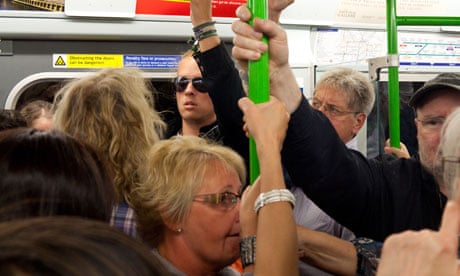More than a fifth of rail commuters entering London are forced to stand at the busiest times of the morning rush-hour, according to figures.
Passengers on some morning and evening peak services are travelling on trains that are carrying 60% more people than they were designed to hold, the Department for Transport data shows.
Consumer groups said commuters were being pushed to the limit by an unacceptable combination of overcrowded trains and spiralling ticket prices.
The most overcrowded service, revealed in a "snapshot" in autumn 2012, was the 8.27am Heathrow Express service going to Paddington, London, which carried 786 standard-class passengers, 65% over the capacity figure of 476.
The busiest trains outside the capital in 2012 were in Leeds, Manchester and Sheffield.
The next most crowded were the 6.13pm from London Euston to Birmingham New Street (65% over capacity), and the 6.23am from Manchester airport to Middlesbrough (62%).
On a typical weekday last autumn, 535,000 passengers arrived in central London by train during the morning peak of 07:00 to 09:59; the total was 977,000 across the day.
The DfT said: "In London, overall crowding across both peaks in 2012 was lower than in 2011. However, over 100,000 passengers had to stand during trains' busiest points in the morning peak, a fifth of the overall total."
The transport minister, Norman Baker, said: "Climbing on to a very crowded train is an unpleasant experience and I sympathise with passengers using these services. I urge train operators to do what they can on these particular trains. The department is working closely with the industry to ensure this issue is tackled."
First Great Western had the highest level of passengers in excess of capacity of any London and south-east England operator in 2012, at 7.1% across both peaks of the day, although this was lower than in 2011.
Passengers have complained about intolerably hot travelling conditions in this summer's recent heatwave, discomfort compounded by train cancellations.
Richard Hebditch, campaigns director for the Campaign for Better Transport, said: "These statistics show rail is vital to the economy, getting millions of people to work every day. But it also shows many commuters are faced with an unacceptable combination of overcrowded trains and spiralling ticket prices.
Government needs to give rail passengers a fair deal by ending above-inflation ticket price hikes and making sure franchise holders tackle overcrowding."
Train companies insisted they were taking action to address the problem. A spokesperson for the Association of Train Operating Companies said: "By increasing services, running longer trains and making our fleet more reliable, train companies are carrying record numbers of passengers. Year on year, the official measure of overcrowding during peak times has fallen slightly overall.
"We recognise that some services remain crowded and passengers get frustrated when they can't get a seat, which is why the rail industry is planning to increase peak- time seats into and out of major cities by almost a third by 2019."
Bob Crow, leader of the RMT rail union, said: "While passengers are forced to pay through the nose to stand, crammed in on sweltering, overcrowded trains, the private companies running these services are making huge profits in the safe knowledge that the whole racket of rail privatisation is a one-way ticket to the bank."
The most-crowded routes in autumn 2012 by overcapacity
8:27am Heathrow-London Paddington 65%
> 6.13pm London Euston-Birmingham New Street 65%
> 6:23am Manchester airport-Middlesbrough 62%
> 6;00pm London Waterloo-Portsmouth Harbour 61%
> 7:17am Banbury-London Marylebone 58%
> 6:19am Birmingham Moor St-London Marylebone 55%
> 7:32am Tattenham Corner-London Bridge54%
> 6:15am Portsmouth Harbour-London Waterloo 50%
> 7:09am Henley-on-Thames-London Paddington 49%
> 7:10am Haslemere-London Waterloo 49%
